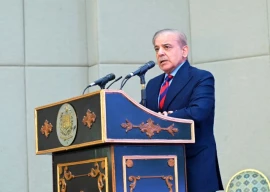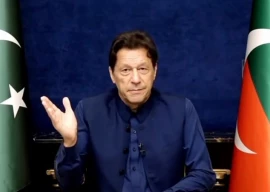
The report of the Parliamentary Committee on National Security has all the right sentiments and pious hopes. Much of its recommendations, such as pursuing a solution for the Kashmir issue, enhancing strategic partnership with China and reinforcing relations with the Islamic world, are unobjectionable. But its primary focus remains the US, with other countries and issues receiving short shrift.
The government had claimed that parliament’s involvement was meant to ‘review’ the foreign policy inherited by it. But this was recognised as disingenuous, because if that had been the intention, it would have initiated the process within weeks of coming into power. Had this been done, our foreign policy would have acquired domestic legitimacy and external credibility, as review of foreign commitments by a new government and especially one that succeeds a military dispensation, would have been viewed as within the norms of normal interstate relations. But having not merely honoured the military regime’s commitments, and engaged in the less-than-honourable policy of seeking refuge behind public denunciations of US actions, while privately endorsing them, the government found itself in an untenable situation in the wake of the ghastly Salala episode. Consequently, Pakistan-US relations, already lurching from one crisis to another, went into a nosedive. The bonhomie between Secretary of State Hillary Clinton and Shah Mehmood Qureshi appeared to be a distant dream, as did the claims of having established a strategic relationship.
Of the committee’s key recommendations, the most critical relate to the unconditional apology for the Salala attack, resumption of Nato supplies, cessation of drone attacks and the pursuit of the Iran-Pakistan gas pipeline project. Of these, the first can be finessed, as the administration was already inclined to do so, but for the sharp Republican reaction to President Barack Obama’s apology over the desecration of the Holy Quran by US troops in Afghanistan. Resumption of Nato supply lines, even on revised terms, should be welcomed to by the US. It is critical to the coalition’s operations now and likely to become more so during the course of the ‘endgame’. But the recommendation is bound to arouse great opposition within the country as it smacks of our legislators’ penchant for ‘commercial deals’. The demand for the cessation of drone attacks is, however, likely to be the most contentious one, particularly as the Obama Administration considers them to be the weapon of choice in the war against terrorism, as evident from their increased frequency and worldwide use.
With regards to the gas pipeline project with Iran, Secretary Clinton has not only publicly opposed it, but even threatened the imposition of sanctions should Pakistan take this ‘inexplicable’ step. Parliament’s endorsement should be welcomed by the government, though many suspect that there is a considerable gap between its public rhetoric and private position, as evident from its policy of acting slowly.
That the Parliamentary Committee sees no problem with the use of our bases or air space by foreign forces if done with parliament’s approval, or with reopening of Nato supply routes — on a revision of terms and conditions — demonstrates preference for ‘transactional relations’ with the US rather than a broad-based understanding. Worse, parliament is not opposed to the presence of foreign intelligence operatives either. All of this smacks of our historic proclivity for a ‘rentier’ attitude. The legislators have to ask themselves if the role of a ‘hired gun’ is in conformity with the people’s wishes.
The US has welcomed parliament’s recommendations, with Secretary Clinton emphasising that the US sought “an honest, constructive, mutually beneficial relationship with Pakistan”, but highlighting significantly, though not surprisingly, her expectation of cooperation with Pakistan, “particularly in the fight against terrorism”. That is the only issue that appears to matter to the US.
Published in The Express Tribune, March 28th, 2012.
COMMENTS (17)
Comments are moderated and generally will be posted if they are on-topic and not abusive.
For more information, please see our Comments FAQ




















1715142871-0/imfsalary-(1)1715142871-0-270x192.webp)





@Arjit Sharma Please keep your Indian propaganda to yourself. Every debate about Pakistan on ET is ruined by few Indian propagandists.
@Arijit Sharma
I agree word for word.We should not equate people with the government.Whether it's Americans or Pakistanis.
@Feroz:
This is how it works in nations that have strong institutions. Unfortunately PAK has no strong institutions.
@Dee Cee: " .. Sharmaji, I don’t know whether you are Indian, Pakistani, or from Mars, but please don’t unleash your vitriol at every occasion you get. ... "
Please try to understand what I have written. The logic behind my statement is - if the Pakistani ruling elite did not have fantasies about extra-regional origins, they would not think of India ( or Hindus basically ) as enemies, but as distant relatives. Because India is thought of as enemy, the Pakistani elite enters into transactional relations with extra-regional powers with the only aim of checkmating India. Case in point Zia-ul-Haq - he fought Americas Afghan War - why - was it for his love of Islam - no - he very well knew he could arm Pakistan against India in return for support. And what has that got Pakistan in the long run ?
And please, there is no condescension in my message. I have met many Pakistanis informally during my travels, and most of them, I will tell you, are the finest specimens of humankind.
( I also appreciate that you spoke up. )
@Javed Ji : . Pakistan’s rentier attitude will remain alive for a long time to come as it is not something “created” in the recent past.
Pakistan’s rentier attitude was not created by the Pakistani Military but it was created by the Qaid-E-Alam when he requested two billion dollars from the United States in 1947. This is as per the archived documents, more specifically the memorandum of conversation between Mir Laik Ali and the State Department officials, 30 October 1947., NO. 845F.51/10-3047. This has been cited in Ayesha Jalal’s book, “The State of Martial Rule”. This is as per Yousuf Nazar’s comment on Jul 8, 2010 - 11:23PM
I quote from the Article by Yousuf Nazar . http://tribune.com.pk/story/25856/a-nation-in-denial/ . A nation in denial - By Yousuf Nazar - Published : July 5, 20101 . Pakistan’s founders were responsible for sowing the seeds of a client-state relationship with the US. As head of a newly-born ‘moth-eaten Pakistan’, to use Jinnah’s own words, and with little or no financial resources, he was wrong to seek a military solution to Kashmir with Pakistan completely dependent on Britain for its survival and so desperate that it requested a two-billion dollar loan from America in October 1947, negating the very spirit of independence from colonial rule. . As such one does not foresee Pakistan eschewing its “Rentier” Attitude in this decade. Things might change in the 2020s but not earlier. . Cheers
@Arijit Sharma: What has "natural roots" got to do with the state policy that can still be remedied? If Pakistan reviews the policy and adopts a "non-rentier" attitude, will it mean that they have suddenly got back to their "natural roots"? Sharmaji, I don't know whether you are Indian, Pakistani, or from Mars, but please don't unleash your vitriol at every occasion you get. As an Indian, I feel bad when some regular Indian commentors act holier-than-thou and pass snide remarks at Pakistanis in a very unrelated manner. If the article were about Pakistani identity, your comment would have made sense. Now it is so tangential that it appears to be gratuitous condescension and insult.
@Mods: Why don't you delete such unrelated comments? They don't create very good image of Indians and your Pakistani readers hate it.
"government has sought to dampen countrywide anti-American anger and outrage by passing to parliament the responsibility for reviewing our foreign ties; in particular, relations with the US." . With all due respect that makes no sense. It should be clear to anyone that your Parliament is about as anti USA as it gets. Anyone who thinks your Parliament is going to dampen anti-American sentiment is out of touch with reality.
@Javed:I don't think Mr Fatemi remained indifferent to what you are saying, I can smell it by reading only para 3 of this article. To me the writer has been very practical and is forward looking rather than just criticizing the past.
An excellent suggestion to the parliament.
@Javed: Another name for all that you have said is leadership crisis. Somebody needs to own the buck!
@Arjit,
Who has denied the origins. Are they not the descendents of Ghazhani and Ghori. It is an elaborate conspiracy of the cartographers not to have placed them between between Syria and Jordan.
It is the job of the Foreign Minister to make foreign policy, not Parliament. If Foreign Minister is no good sack him/her.
@Javed, What you said is absolutely true. I think most people know what you have said. However, the military , government, Parliament put on this drama on a regular basis for the enjoyment of the populace. The military writes the script and the rest are state sponsored actors.
This is all about seeing if uncle Sam can be shaken for few more dollars.
Pakistan was, is and will always remain a rentier state. It just cannot survive without being a rentier state and entering into a "transactional relationship" with USA, China and Saudi Arab.
What else is going to fund the bloated army otherwise?
The writer for all his experience fails to see (or pretends not to see) that the military used the Govt to wriggle out of an embarrassing situation. The Govt. weak as it is, threw the issue in the Parliament’s direction to save itself from the wrath of the Right wing. The result is a mess for both the Govt. and the Military with both sides ending up loosing.
" ... The rentier attitude remains alive! ... "
When a people deny their origins, they lose a natural connection with their land and subsequently they lose all sense of morality and life becomes a series of "eik raat ki dulhan" interactions.
Articles such as this do not mean much,they achieve even less.